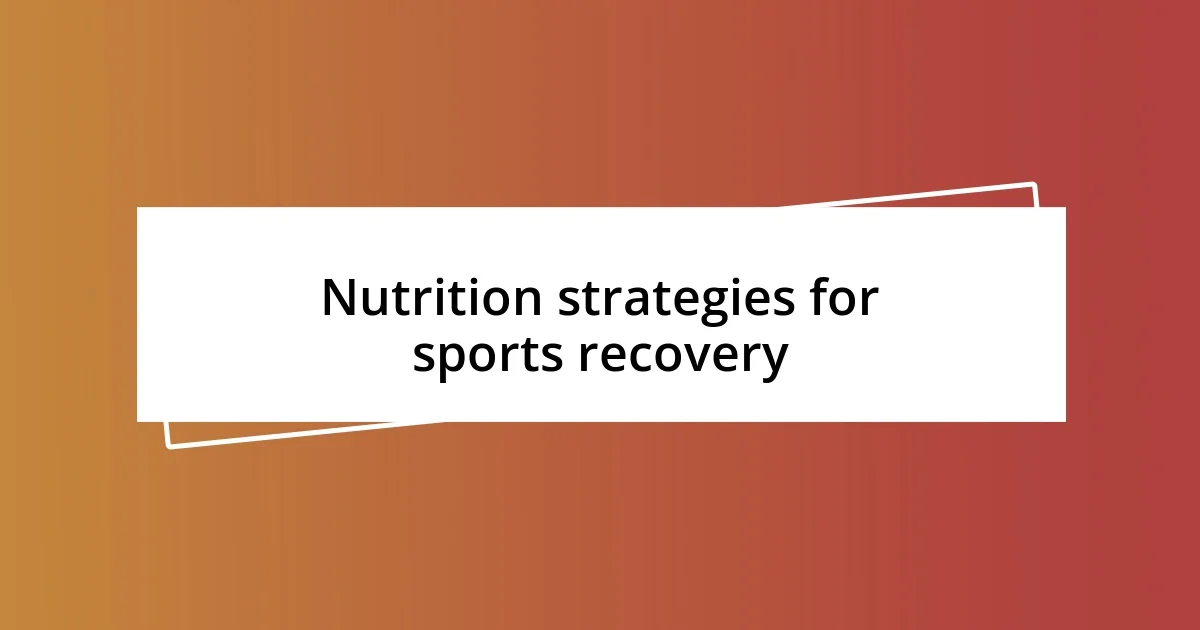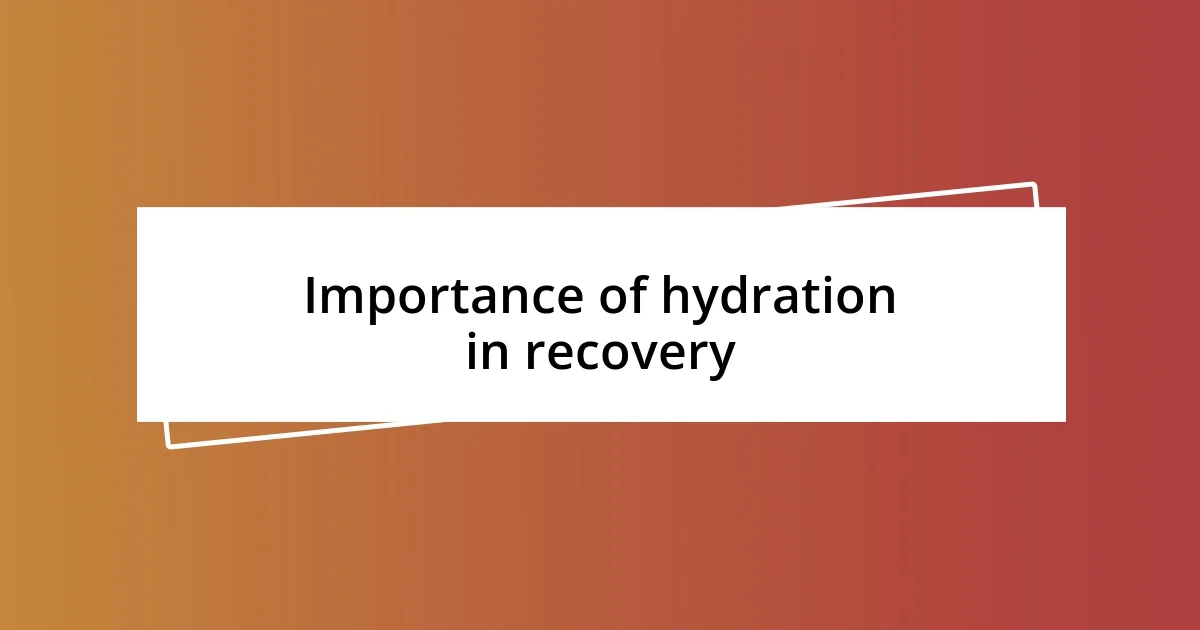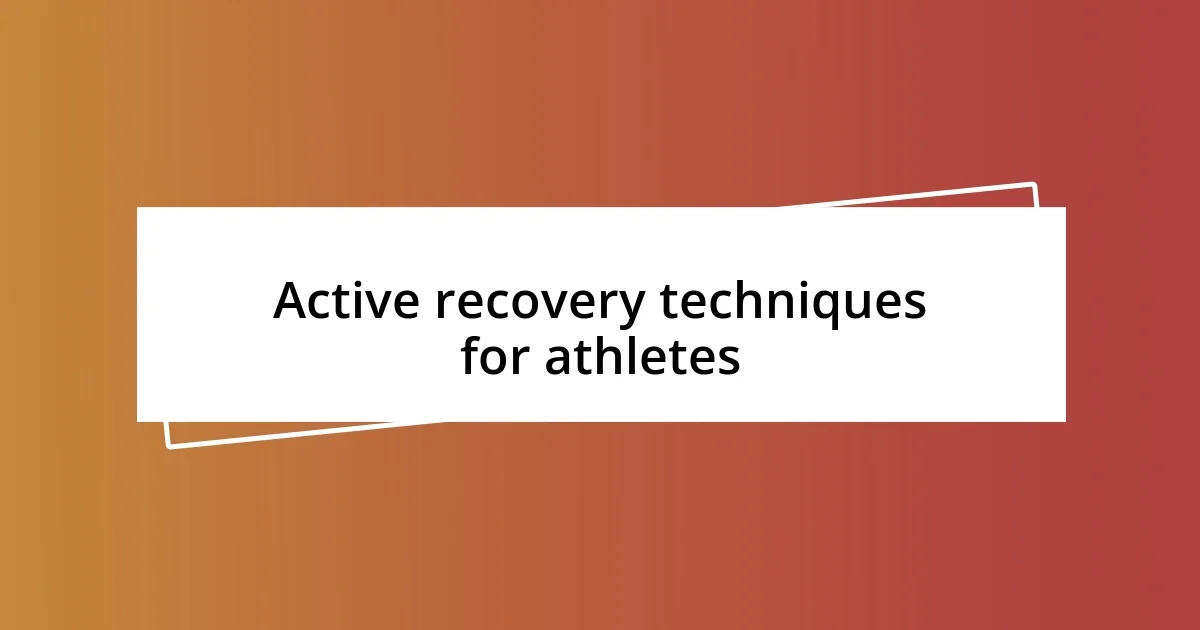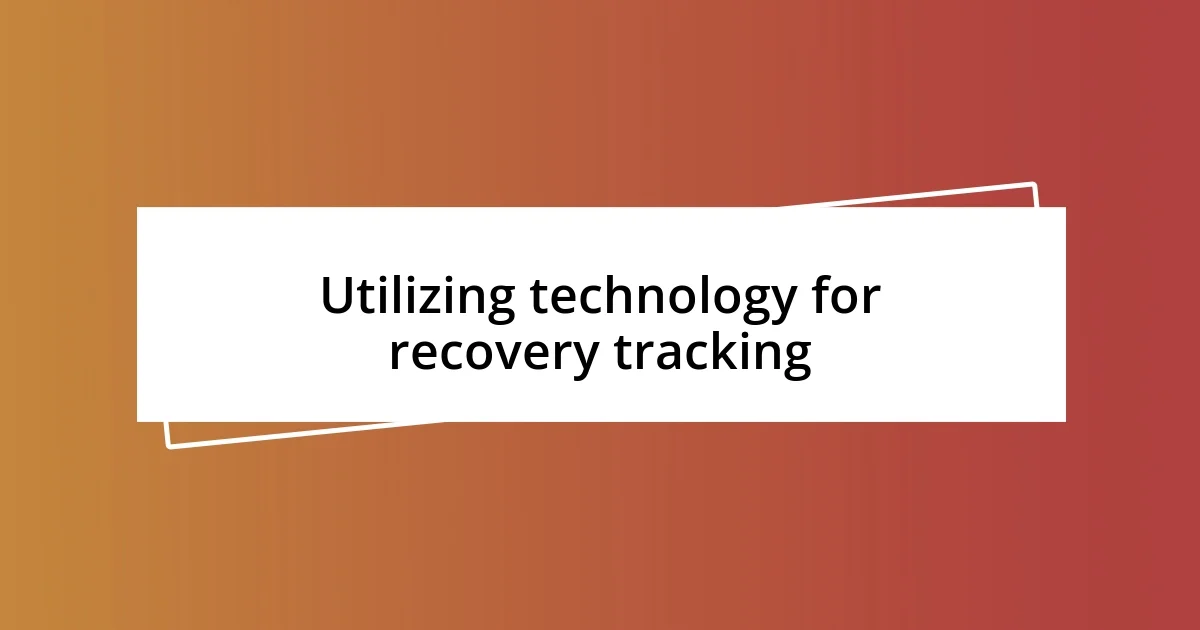Key takeaways:
- Prioritizing recovery through hydration, nutrition, sleep, and active recovery techniques significantly enhances athletic performance and prevents injuries.
- Implementing a structured post-workout meal within 30 minutes and maintaining hydration throughout the day are crucial for effective recovery.
- Utilizing technology, such as fitness trackers and recovery devices, can provide data-driven insights to optimize recovery routines and overall performance.

Understanding sports recovery importance
Understanding the importance of sports recovery feels essential to me after countless experiences on the field. I’ve pushed my body to its limits only to realize that without proper recovery, my performance inevitably suffers. Isn’t it fascinating how taking a step back can lead to greater strides forward?
I remember a time when I didn’t prioritize recovery; the fatigue lingered and my motivation dwindled. It was only after I embraced strategies like stretching and adequate sleep that I felt refreshed and ready to tackle even tougher workouts. Have you ever noticed how recovering well can transform a sluggish day into one filled with energy?
Recovery isn’t just about resting; it’s about listening to your body and understanding its needs. When I started paying attention to signs of fatigue or soreness, I realized these were my body’s way of asking for a pause. How many missed opportunities for improvement have you had because you neglected this important aspect of your training?

Key components of effective recovery
Effective recovery is multifaceted, and each component plays a significant role in enhancing performance while preventing injuries. I’ve felt the difference when I incorporate various strategies into my routine. For instance, post-workout nutrition is crucial; I’ve learned that refueling my body within that golden hour after exercise makes a world of difference in how I feel the next day.
Key components of effective recovery:
- Hydration: Staying hydrated helps flush out toxins and supports muscle function. I always make it a point to drink water or an electrolyte drink after every training session.
- Nutrition: Consuming a balanced meal with protein and carbohydrates can kick-start recovery. After my last long run, my go-to was a smoothie packed with protein powder, bananas, and spinach.
- Sleep: Quality sleep is non-negotiable. I restructured my evening routine, and now, I prioritize winding down to ensure I get those valuable hours of deep rest.
- Active Recovery: Engaging in light activities like walking or yoga helps keep blood flowing to my muscles. On days when I feel particularly sore, a gentle yoga session or a long walk always lifts my spirits.
- Stretching and Foam Rolling: Incorporating stretching and foam rolling into my post-workout routine has helped alleviate muscle tightness. I can’t tell you how many times I felt a breakthrough after taking ten minutes to roll out my muscles!

Nutrition strategies for sports recovery
Nutrition plays a vital role in optimizing sports recovery. I’ve personally experienced how a well-timed meal can significantly impact my energy levels and muscle repair. For instance, after an intense game, I’ve found that a meal rich in both carbohydrates and protein, like grilled chicken with quinoa and veggies, helps me bounce back faster. It’s amusing how simple choices like this can lead to more productive training sessions.
When contemplating recovery nutrition, I often think of the timing as much as the food itself. I’ve made it my mission to consume my post-workout snack within 30 minutes after finishing my workout. This practice has proven invaluable; I can recall a particularly grueling session when I indulged in Greek yogurt with berries and nuts. Not only did it satisfy my cravings, but it also gave my body exactly what it needed to recover effectively. Have you ever noticed how quickly your body responds when you fuel it right?
Hydration is another essential aspect I can’t stress enough. I’ve learned that an adequate intake of liquids promotes better recovery and helps to prevent muscle cramps. Just the other week, after an exhausting run, I picked up my trusty electrolyte drink. It felt like a small but satisfying win. Whenever I remind myself to hydrate, I notice not just improved recovery but also increased clarity during training. A well-nourished body leads to a focused mind, don’t you agree?
| Nutrition Strategy | Overview |
|---|---|
| Post-Workout Meal | A meal with carbohydrates and protein aids muscle repair. |
| Timing | Eating within 30 minutes after exercise maximizes recovery. |
| Hydration | Staying hydrated prevents cramps and enhances recovery. |

Importance of hydration in recovery
Hydration plays a vital role in how quickly I recover after intense workouts. I remember a time when I underestimated its importance during a particularly hot summer training session. I didn’t drink enough water, and by the end, I was feeling sluggish and unable to push through my last few sprints. It hit me then that without proper hydration, my body was literally running on empty.
Every time I finish a workout, I make it a point to replenish fluids, not just with water but often with a hydrating drink that includes electrolytes. These minerals are crucial, especially after sweating, as they help with muscle recovery and reduce the risk of cramps. I’ve even tracked my performance on days when I prioritize hydration versus when I neglect it—a noticeable difference emerges! Have you ever felt that immediate relief after hydrating? It’s as if your muscles suddenly wake up and say, “Thank you!”
In my experience, hydration doesn’t stop with just post-workout drinks; it’s a constant commitment throughout the day. I often set reminders on my phone to sip water, especially when I’m busy. One evening, I realized I had barely touched my water bottle between training sessions and work, and I woke up feeling more fatigued than usual. It’s a simple lesson that reinforces the idea: being intentional about hydration is as crucial as the workout itself. What hydration tricks have you found helpful?

Role of sleep in recovery
Sleep is a game-changer in sports recovery, and I’ve come to appreciate its power over the years. I remember days when I skimped on sleep, convinced I could make up for it with extra workouts. Those days often left me feeling sluggish, and no amount of caffeine could mask that overpowering fatigue. Have you ever tackled a training session while running on fumes? It’s not fun, and it definitely hampers your performance.
The connection between sleep and recovery is scientifically backed, and I’ve experienced it firsthand. I learned that during deep sleep, my body works hard to repair muscle tissue and replenish energy stores. There was one week I prioritized sleep over late-night TV, aiming for seven to eight hours each night. The next week, I felt like a different athlete—my endurance improved, and I completed workouts with ease. Could there really be a more effective performance-enhancer than a solid night’s sleep?
In my experience, quality truly matters as much as quantity when it comes to sleep. I recall a particularly challenging tournament where I was stressed about my performance. I found that practicing relaxation techniques, like deep breathing, before bed made a significant difference. Not only did I wake up feeling more refreshed, but I also faced each game with renewed confidence and clarity. Have you found specific rituals that help you wind down? Trust me, crafting a good sleep routine is as vital as any training regimen you follow.

Active recovery techniques for athletes
Active recovery is essential for athletes, and I’ve discovered several techniques that make a tangible difference in how my body feels post-training. One of my favorites is light jogging or brisk walking to flush out lactic acid from my muscles. I remember finishing a particularly grueling sprint interval session and opting to jog lightly for a mile instead of just cooling down. The next day, I felt significantly less sore, and my legs were much more ready to tackle the next workout. Does a gentle run not sound more appealing than stiff, aching muscles?
Incorporating yoga into my routine has revolutionized my active recovery days. There was a time when I viewed yoga as just stretching, but after attending a few classes, I realized how deeply it connects the body and mind. Holding poses and focusing on my breath after a tough week made my muscles feel nimble and rejuvenated. I can’t emphasize enough how much a good yoga session helps my mental clarity as well. Have you ever tried using yoga to not only recover but also to find a moment of peace after a hectic week?
Furthermore, I’ve found swimming to be an excellent form of active recovery. After an intense training camp, I dove into the water and was amazed at how soothing the gentle resistance felt on my tired limbs. The buoyancy allowed me to move without straining, making recovery feel effortless and enjoyable. In that moment, I understood why many athletes gravitate towards the pool. How does it feel to let go of the gravity that weighs you down? Trust me; the refreshing sensation of swimming can be both revitalizing and liberating.

Utilizing technology for recovery tracking
Leveraging technology for recovery tracking has been a game-changer in my routine. I remember the excitement I felt the first time I strapped on a fitness tracker and saw how it monitored my heart rate variability. I could see the direct correlation between my training loads and my recovery status, which helped me make smarter decisions about when to push harder and when to rest. Have you ever considered how a simple device could significantly improve your performance?
Data analysis tools have transformed the way I view my recovery progress. Recently, I started using an app that aggregates my sleep patterns, workout data, and nutrition intake all in one place. Reviewing this comprehensive information helped me pinpoint areas where I was falling short, like hydration after intense sessions. It’s fascinating how a bit of data can guide my daily habits, isn’t it?
I’ve also experimented with recovery devices, like infrared therapy and compression boots. I recall a day after an exhausting competition when I decided to give a compression session a try. The sensation of gentle pressure around my legs felt therapeutic as it pushed out the fatigue and lactic acid. It’s remarkable how technology can create a tangible shift in how I feel physically. Have you noticed any remarkable tools that transform your recovery game?












